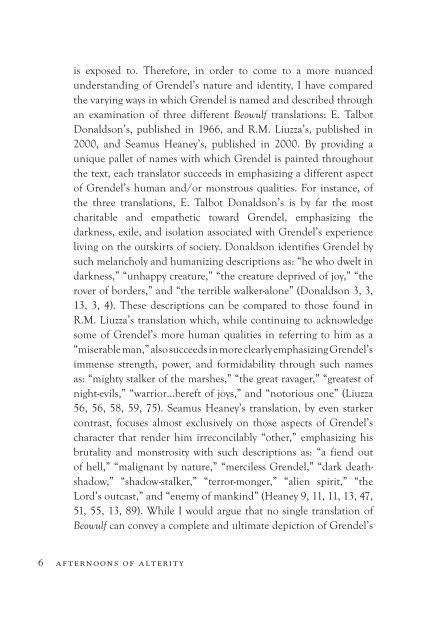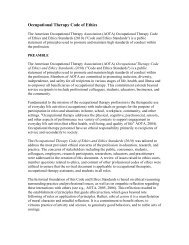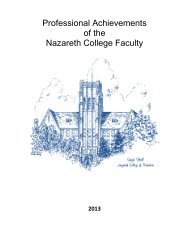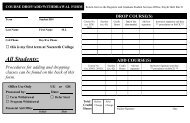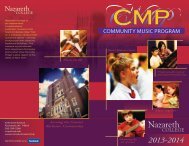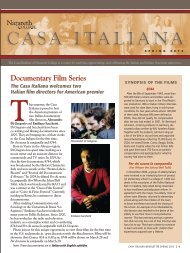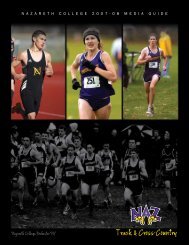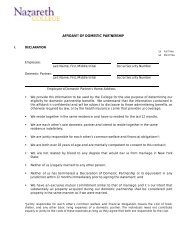Afternoon of Alterity - Nazareth College
Afternoon of Alterity - Nazareth College
Afternoon of Alterity - Nazareth College
Create successful ePaper yourself
Turn your PDF publications into a flip-book with our unique Google optimized e-Paper software.
is exposed to. Therefore, in order to come to a more nuancedunderstanding <strong>of</strong> Grendel’s nature and identity, I have comparedthe varying ways in which Grendel is named and described throughan examination <strong>of</strong> three different Beowulf translations: E. TalbotDonaldson’s, published in 1966, and R.M. Liuzza’s, published in2000, and Seamus Heaney’s, published in 2000. By providing aunique pallet <strong>of</strong> names with which Grendel is painted throughoutthe text, each translator succeeds in emphasizing a different aspect<strong>of</strong> Grendel’s human and/or monstrous qualities. For instance, <strong>of</strong>the three translations, E. Talbot Donaldson’s is by far the mostcharitable and empathetic toward Grendel, emphasizing thedarkness, exile, and isolation associated with Grendel’s experienceliving on the outskirts <strong>of</strong> society. Donaldson identifies Grendel bysuch melancholy and humanizing descriptions as: “he who dwelt indarkness,” “unhappy creature,” “the creature deprived <strong>of</strong> joy,” “therover <strong>of</strong> borders,” and “the terrible walker-alone” (Donaldson 3, 3,13, 3, 4). These descriptions can be compared to those found inR.M. Liuzza’s translation which, while continuing to acknowledgesome <strong>of</strong> Grendel’s more human qualities in referring to him as a“miserable man,” also succeeds in more clearly emphasizing Grendel’simmense strength, power, and formidability through such namesas: “mighty stalker <strong>of</strong> the marshes,” “the great ravager,” “greatest <strong>of</strong>night-evils,” “warrior…bereft <strong>of</strong> joys,” and “notorious one” (Liuzza56, 56, 58, 59, 75). Seamus Heaney’s translation, by even starkercontrast, focuses almost exclusively on those aspects <strong>of</strong> Grendel’scharacter that render him irreconcilably “other,” emphasizing hisbrutality and monstrosity with such descriptions as: “a fiend out<strong>of</strong> hell,” “malignant by nature,” “merciless Grendel,” “dark deathshadow,”“shadow-stalker,” “terror-monger,” “alien spirit,” “theLord’s outcast,” and “enemy <strong>of</strong> mankind” (Heaney 9, 11, 11, 13, 47,51, 55, 13, 89). While I would argue that no single translation <strong>of</strong>Beowulf can convey a complete and ultimate depiction <strong>of</strong> Grendel’s6 afternoons <strong>of</strong> alterity


